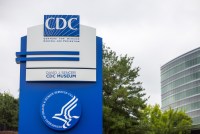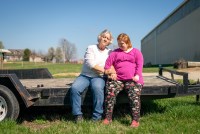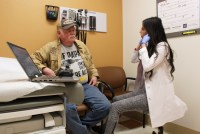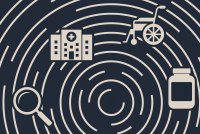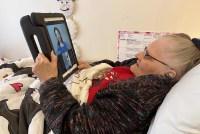The CDC Lacks a Rural Focus. Researchers Hope a Newly Funded Office Will Help.
Advocates for improving rural health pushed for the CDC to extend its rural health focus by creating an Office of Rural Health. They hope the agency will commit to rural health research and provide analyses that lead to good public health policies for rural communities.
People With Down Syndrome Are Living Longer, but the Health System Still Treats Many as Kids
The median life expectancy for a U.S. baby born with Down syndrome jumped from about four years in 1950 to 58 years in the 2010s. That’s largely because they no longer can be denied lifesaving care, including surgeries for heart defects. But now, aging adults with Down syndrome face a health system unprepared to care for them.
As Montana’s Mental Health Crisis Care Crumbles, Politicians Promise Aid
One of Montana’s largest mental health providers has ratcheted back services amid financial troubles, leaving a vacuum. State policymakers have promised more money to aid behavioral health care, but lasting change could be years out.
Falta de doctores y residencias médicas impactan en la salud de las zonas rurales
Expertos dicen que los factores sistémicos son barreras comunes para establecer y mantener programas de capacitación para médicos en las zonas rurales de Estados Unidos.
Doctor Shortages Distress Rural America, Where Few Residency Programs Exist
Patients in rural northeastern Nevada soon will have fewer providers and resources, after a local hospital decided to close its medical residency program. Nationally, the number of rural residency slots has grown during the past few years but still makes up just 2% of programs and residents nationwide.
Special Medicaid Funds Help Most States, but Prompt Oversight Concerns
Georgia is among 35-plus states that have used an under-the-radar federal funding mechanism to boost payments for hospitals and other providers under Medicaid. But a government watchdog and a congressional advisory commission say sparse oversight makes it hard to tell if the “directed payments” program is meeting its goals.
Abortion Clinics in Conservative-Led States Face Increasing Legal Threats
Since the U.S. Supreme Court reversed federal protections for abortions, medical providers in conservative-led states have been fighting legal and political battles — as well as escalating threats from the anti-abortion movement.
Journalists Explain Impact of Texas Judge’s ACA Decision and Cuts in Federal Food Benefits
KHN and California Healthline staff made the rounds on national and local media this week to discuss their stories. Here’s a collection of their appearances.
States Step In as Telehealth and Clinic Patients Get Blindsided by Hospital Fees
At least eight states have implemented or are considering limits on what patients can be billed for the use of a hospital’s facilities even without having stepped foot in the building.
Minnesota Overhauled Substance Use Treatment. Rural Residents Still Face Barriers.
A recent policy change in Minnesota promotes quick evaluations and care for people with substance use disorders. But because of gaps riddling rural treatment systems nationwide, the promise of swift care isn’t reaching rural Minnesotans.
Truly Random Drug Testing: ADHD Patients Face Uneven Urine Screens and, Sometimes, Stigma
Doctors have no national standards on when to order urine tests to check whether adult ADHD patients are properly taking their prescription stimulants. Some patients are subjected to much more frequent testing than others.
Congressman Seeks to Plug ‘Shocking Loophole’ Exposed by KHN Investigation
A federal lawmaker has introduced a House bill that would close one of a laundry list of oversight gaps revealed in a recent KHN investigation of the system regulators use to ban fraudsters from billing government health programs, including Medicare and Medicaid.
As Colorado Reels From Another School Shooting, Study Finds 1 in 4 Teens Have Quick Access to Guns
The study analyzed Colorado kids’ responses to how quickly they could get their hands on a loaded gun without their parents’ knowledge. More than 1 in 10 said they could do so within 10 minutes.
Banning Noncompete Contracts for Medical Staff Riles Hospitals
It’s about the money — on both sides — as arguments swirl about patient safety, rising prices, and paying back on-the-job training.
Health Providers Scramble to Keep Remaining Staff Amid Medicaid Rate Debate
The ranks of community-based behavioral health providers in Montana have diminished amid rising costs, greater need, and stagnant Medicaid reimbursement rates. Now, as state lawmakers debate solutions, providers are hoping just to cover their costs.
Legal Questions, Inquiries Intensify Around Noble Health’s Rural Missouri Hospital Closures
A year after private equity-backed Noble Health shuttered two rural Missouri hospitals, a slew of lawsuits and state and federal investigations grind forward. Missouri Attorney General Andrew Bailey recently confirmed an “ongoing” investigation as former employees continue to go unpaid and cope with unpaid medical claims.
Fresh Produce Is an Increasingly Popular Prescription for Chronically Ill Patients
Fresh produce prescription programs are getting a boost in Montana as a way of helping people with chronic conditions such as diabetes and high blood pressure. The approach may be a model for other rural states to promote healthy eating in food deserts.
End of Covid Emergency Will Usher in Changes Across the US Health System
The May 11 expiration of the federal government’s pandemic emergency declaration will affect patient care across a broad range of settings, including telemedicine, hospitals, and nursing homes.
Mental Health Care by Video Fills Gaps in Rural Nursing Homes
In-person mental health care is hard to arrange in rural nursing homes, so video chats with faraway professionals are filling the gap.
Mobile Clinics Really Got Rolling in the Pandemic. A New Law Will Help Them Cast a Wider Safety Net.
Mobile clinics that provided covid-19 testing and vaccines at the peak of the pandemic are now being used to provide a range of health services in hard-to-reach communities. A law passed late last year allows qualified health care centers to use federal grants to expand the fleets.




